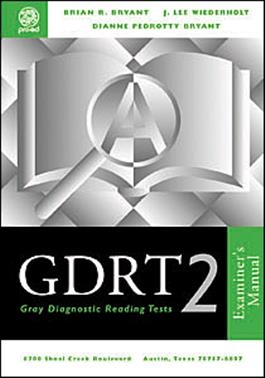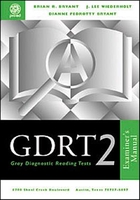TOSWRF-2: Test of Silent Word Reading Fluency-Second Edition
TOSWRF-2: Test of Silent Word Reading Fluency-Second Edition
Ages: 6-3 through 24-11
Testing Time: 3 minutes for a single form or 6 minutes for any two forms
Administration: Group or Individual
- Ideal for universal screening and progress monitoring.
- Four equivalent forms measure reading vocabulary and general reading ability.
- Used as the outcome measure in the Reading First Impact Study.
- Normed on school- and college-age students.
- Three minutes to administer to individuals or groups.
- Minimal false positives and false negatives.
The new Test of Silent Word Reading Fluency- Second Edition (TOSWRF-2) provides a reliable and valid measure of students' ability to recognize printed words accurately and efficiently. Its first edition has been popular with professionals in psychology, education, and reading and was used as an outcome measure in the congressionally-mandated evaluation of the federal government's No Child Left Behind Act of 2001 (PL 107-110, title 1, Part B, Subpart1) known as the Reading First Impact Study (Gamse, Jacob, Horst, Boulay, & Unlu, 2008).
The TOSWRF-2 is a companion to the Test of Silent Contextual Reading Fluency- Second Edition (TOSCRF-2). While the TOSWRF-2 measures a student's ability to recognize individual words accurately and efficiently, the TOSCRF-2 measures a student's essential contextual reading abilities (i.e., word identification, word meaning, word building, sentence structure, comprehension, and fluency).
New Features of the TOSWRF-2
- New normative data were collected between 2009-2012.
- Co-normed with the TOSCRF-2 and TWS-5.
- Normative information was extended downward to include ages 6 years 3 months and upward to include ages 18-0 through 24-11.
- Alternate forms were increased from two to four.
- An all-new, one-minute practice form was added to each TOSWRF-2 form.
- Administration instructions were updated to expand the use of TOSWRF-2, particularly with deaf and hard of hearing students.
- A Supplemental Administration and Scoring Instruction booklet is now included for greater convenience in school-wide universal screening applications.
- Scoring keys were revised.
- Practice effects have been addressed.
- Evidence for validity has been expanded to include studies by independent researchers as well as by the test authors.
Description of the TOSWRF-2
The TOSWRF-2 has four equivalent Student Record Forms and a test manual. It can be used by classroom teachers, special education teachers, reading specialists, school psychologists, or any other education professional who has some training in standardized test administration. The norms are based on a representative sample of more than 2,429 individuals ranging in age from 6-3 to 24-11 years and residing in 35 states. Raw scores, standard scores, percentiles, and age and grade equivalents are provided.
Using a testing format originally pioneered by Guilford in his Structure of Intellect studies, the TOSWRF-2 measures a students' current reading levels by counting the number of printed words that they can identify within 3 minutes. Students are presented with rows of words, ordered by reading difficulty; no spaces appear between the words (e.g., dimhowfigblue). Students are given 3 minutes to draw a line between the boundaries of as many words as possible (e.g., dim/how/fig/blue).
Any one of the four equivalent forms (A, B, C, and D) may be administered to a single child or an entire classroom of children, depending on the purpose of the assessment. While most uses require only a single form administration, you may administer any two forms concurrently to increase reliability. A single form can be administered in 3 minutes and two forms can be administered in 6 minutes.
New validity studies for TOSWRF-2 show that it is valid for a wide variety of subgroups, as well as for the general population. In addition, we have expanded our study of the test's validity by investigating its diagnostic accuracy as it relates to its sensitivity, specificity, classification accuracy, and receiver operating characteristic/area under the curve (ROC/AUC). These analyses are particularly rigorous, evidence-based techniques for establishing validity.
The TOSWRF-2 can be used to:
- Identify students with word-level and general reading difficulties and document the degree of their problems.
- Screen large numbers of students at once.
- Monitor student progress up to four times per year.
- Research the nature of reading difficulties.
COMPLETE TOSWRF-2 KIT INCLUDES: Examiner's Manual, 25 Student Record Forms A, 25 Student Record Forms B, 25 Student Record Forms C, 25 Student Record Forms D, all in a sturdy storage box. (©2014).
Previous Edition 11260.



